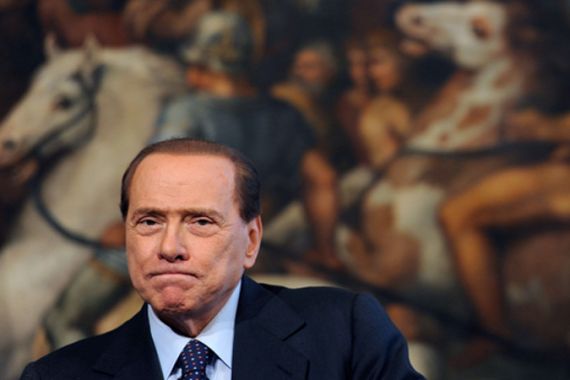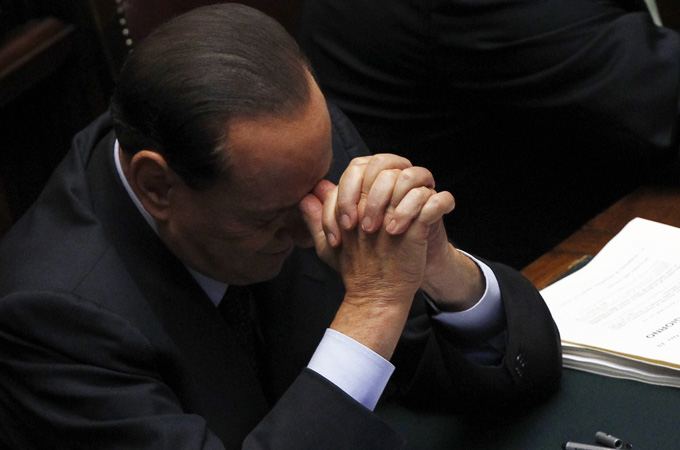Berlusconi set to quit as Italian PM
Prime minister readies to hand president resignation papers after lower house of parliament passes austerity package.

 |
| Silvio Berlusconi has pledged to not stand in new elections after stepping down [Reuters] |
Silvio Berlusconi, Italy’s prime minister, is set to hand in his resignation hours after the country’s lower house of parliament voted in favour of a raft of austerity measures.
Berlusconi had earlier pledged to stand down after the economic measures aimed at avoiding a bailout of the eurozone’s third largest economy were passed.
Parliament’s lower chamber on Saturday passed the reforms, setting in motion a transition aimed at bringing Italy back from the brink of economic crisis.
Former European Commissioner Mario Monti is the top choice to head a transitional government tasked with steering the country out of its debt woes. However, Berlusconi’s allies remain split over whether to support him.
The chamber of deputies, or Italy’s lower house of parliament – with a vote of 380-26 with two abstentions – passed the austerity package in a special session after the senate passed the measures by an overwhelming majority on Friday.
The upper house had voted 156-12 to pass the country’s budget bill, which included the reform measures.
Resignation expected
Berlusconi, 75, is meeting Giorgio Napolitano, Italy’s president, to hand in his resignation. As he drove into the presidential palace, hundreds heckled him in an indication of his growing unpopularity.
“We hope today marks the beginning of a new spring in Italy,” Massimo Donadi, a lawmaker from the opposition Italy of Values party, said during Saturday’s session of parliament with jeering from both sides of the house.
Dario Franceschini of the main opposition Democratic Party said: “Today the curtain falls on a long and painful phase of Italian political history. The country wants to turn the page and start again.”
Hundreds of anti-Berlusconi campaigners rallied outside parliament earlier, waving flags and holding up placards that read “Bye Bye Silvio”.
“Resign! Resign! Resign!” the crowd shouted.
Al Jazeera’s Barbara Serra, reporting from Rome, spoke to anti-Berlusconi demonstrators awaiting the announcement of the leader’s resignation.
“I am waiting for the end of this political system. I am waiting for a new future…He must go. He is a cancer,” said one demonstrator.
Another told Serra: “I came here because I want to see through my eyes this government to collapse. So we’re here to have a party and to see if it is really true – if this nightmare has come to an end.”
Greek-style crisis
Italy is facing a Greek-style economic crisis that many fear would threaten the existence of the entire eurozone and cause a global recession.
Paving the way for Monti’s appointment, President Napolitano made him a senator-for-life on Wednesday, in a surprise move that further boosted his already high profile.
|
Mario Monti’s potential role as Italy’s leader
|
That would mean Napolitano may accept Berlusconi’s resignation as early as Saturday night, and formally mandate Monti to try to form a new government soon afterwards.
Napolitano has urged parliament to act fast, and some analysts say a new government, made up mostly of technocrats, could be in place as early as Sunday night before markets open on Monday.
Napolitano moved quickly to calm markets on Wednesday after Italy’s borrowing costs reached levels that could close its access to market funding, a development which would threaten the future of the eurozone.
He gave assurances that Berlusconi would honour his pledge to step down after parliament approved reforms geared to placate markets, and he would waste no time in either appointing a new government or calling new elections.
Austerity plan
At first, Berlusconi had insisted that early elections were the only option. But he has since softened his stand and is said to be open to a new government.
Monti has been pushed by markets for weeks as the most suitable figure to lead a national unity government to urgently push through further austerity measures.
On Saturday morning, Monti met with the new head of the European Central Bank, Mario Draghi, and leaders of the
centre-left opposition before holding a working lunch with Berlusconi.
Napolitano met Monti on Thursday night, and, in a sign of the urgency of the situation, spoke by telephone with Barack Obama, the US president.
Monti, who is currently head of Milan’s prestigious Bocconi university, is considered a tough negotiator with a record of taking on powerful corporate interests as European Competition Commissioner.